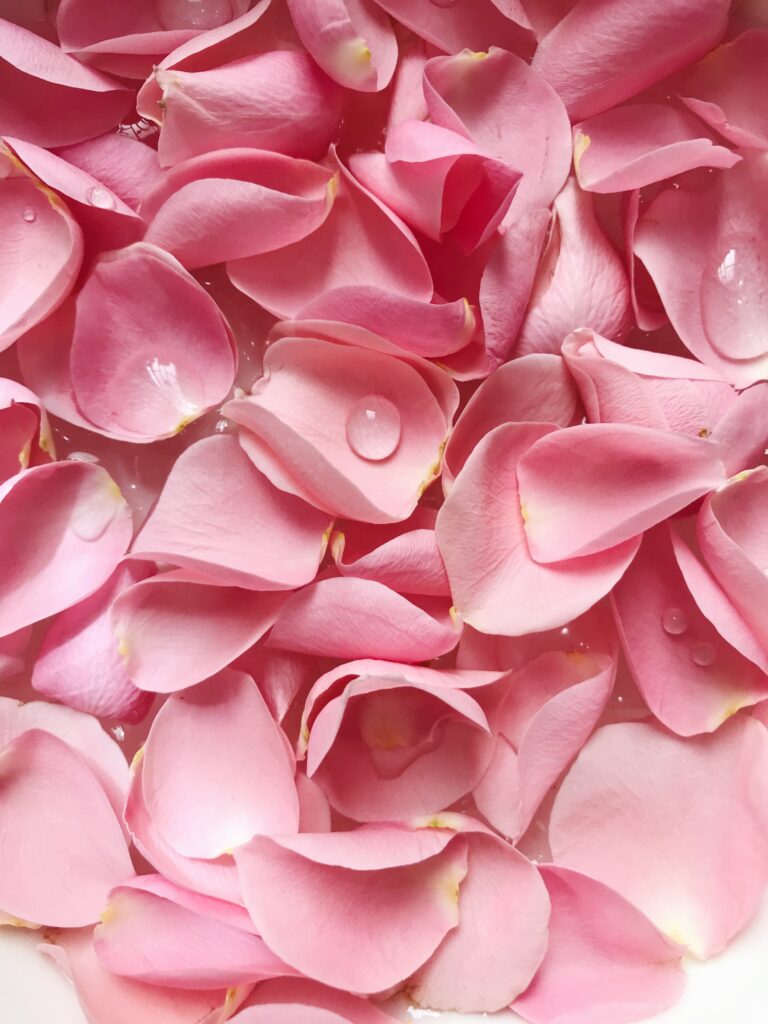What Is Rose Water?
Rose water is water scented with fresh rose petals, made by simmering water with the petals and collecting the steam. It has been used for thousands of years nutritionally, medicinally, and cosmetically. Avicenna, a 10th-century Persian scientist, invented the rose water we know today. First used as a perfume, it quickly spread to Egypt and Rome where it was used in food and skincare. It was believed to be a cure for over 30 ailments, which led some people to drink it daily in their morning cup of tea. Even today, it has plenty of culinary uses, including adding flavor to beverages and baked goods. Rose water now permeates the beauty industry as a key ingredient in natural perfumes and beauty products due to its many skin benefits.
I first decided to try rose water because of its refreshing smell, but it didn’t take long to notice the soothing impact it was having on my sensitive skin. As someone who tries to avoid artificial colors, flavors, and scents, I love that rose water is an all-natural alternative to perfume-y skincare products. Besides its aesthetic appeal, it comes with plenty of health benefits.

It Contains Antioxidants
According to Healthline, rose petals and rose oil both contain powerful antioxidants that can protect skin cells from damage. Antioxidants are an important part of skincare. They foster the regeneration of skin tissue, reduce damage from UV light, stimulate the production of collagen and elastin, and reduce the appearance of wrinkles and pigmentation.
It Reduces Skin Irritation And Redness
Rose water is great for irritation because of its anti-inflammatory properties. A few sprays in the morning or night can have a cooling effect, and will help to reduce acne, eczema, rosacea, or the general irritation that can come with sensitive skin. My little spray bottle of rose water has saved me from the skin irritation that comes with anxiety. Without fail, my face breaks out in a rash in the days following an anxiety attack. Rose water is one of the few things that calms my face and reduces puffiness.
Rose water also works as an anti-bacterial, which means it’s effective for healing small cuts, scratches, and scars. Used as a toner, it can heal tiny abrasions and give the skin a smoother, cleaner appearance.
It Hydrates The Skin
Keeping the skin hydrated is one of the most important things to consider when maintaining a healthy and clear complexion. Rose water is, of course, mostly water—so when it’s applied after washing the face, it adds an extra boost of hydration.
Some toners can feel a bit too harsh, especially for someone with sensitive skin. After a hot shower, using a regular toner can sometimes feel like it’s drying the skin more—even stinging. I like using rose water because it provides a cooling effect without the stinging!
It Has Anti-Aging Properties
Because of its antioxidant effects, it is often seen as an anti-aging product. By helping the skin to heal itself and regenerate new tissue, it can reduce the appearance of wrinkles and provide a healthy glow. It also contains vitamin C, which is known to improve collagen synthesis and “brighten” the skin.
DIY Rose Water Toner
Although there are many natural products, it’s also possible to make from home! Pure Wow offers three methods. Homemade rose water might not last as long as store-bought products, but it feels good to know exactly what goes into your skincare products.
Do you use rose water in your beauty routine?
Also by Cassidy: Vegan Chocolate Peanut Butter Pretzel Pie
One Year After The War: How Animals In Ukraine Have Endured
Get more like this—Sign up for our daily inspirational newsletter for exclusive content!
__
Photo: Nuvia Navarro via Pexels




